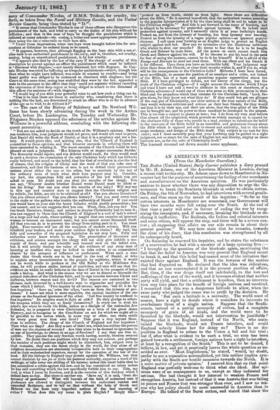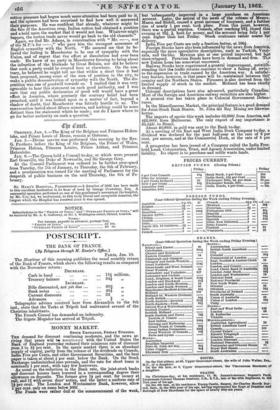AN AMERICAN IN MANCHESTER.
(From the Manchester Guardian.) THE Boston (United States) Daily Courier publishes a diary penned by Mr. R. Adams, son of the American Minister in London, during a recent visit to this city. Mr. Adams came down to Manchester in No- vember last for the purpose of ascertaining the feeling of our merchants and manufacturers on the American question. He was particularly anxious to know whether there was any disposition to urge the Go- vernment to break the Southern blockade in order to obtain cotton. On Friday, the 8th of November, he had interviews with several gentle- men, and thus sums up the result of his inquiries : "So far as the .cotton interests in Manchester are concerned, our Government will have two months more full swing over the South. At the end of. that time a party will arise in favour of ending the war by recog- nizing the insurgents, and, if necessary, breaking the blockade or de- claring it ineffective. The Radicals, the Indian and colonial interests and some others, will oppose the step, and there will be a severe con- test ; all supposing that affairs on our side remain in about their present position." We may here state that he remarks, towards the close of his diary, that this conclusion was strengthened by all he subsequently heard, On Saturday he renewed his inquiries, and he states the substance of a conversation he had with a member of a large spinning firm :— " I brought up the question of the blockade again, mentioning the fact that the belief in America was very general that England meant to break it, and that this belief had caused most of the irritation that existed there against England. It was the lowness of the motive that had disgusted us. He declared that the idea was ridiculous, and that no one contemplated it in the present position of affairs. But, then, if the war drags itself out indefinitely, to the lost and sufferings of the rest of the world, and it becomes evident that neither party will yield, and that a settlement is hopeless, then an interven- tion may take place for the benefit of foreign nations and mankind. I remarked that this was a dangerous latitude to allow, when the same party who judged the cause was to profit by the decision. He went on. Bat such a latitude is a necessity. The world must of course, have a right to decide where it considers its interests to overbalance those of a single nation. Suppose that the South- erners, instead of a partial- monopoly of cotton, had a complete monopoly of grain of all kinds, awl the world were to be 'famished by the blockade, would not intervention be justifiable ? 'Suppose that it was England, instead of the North, who main- tained the blockade, would not France interfere, and could England soberly blame her for doing so ? There is no dis- position in England to refuse to the Union a full and fair trial ; but if, after what is evident to be such a trial, no step has been gained towards a settlement, foreign nations have a right to interfere, at least by a recognition of the South.' This is not to be denied, I believe, in law, and yet it practically leaves the whole question as un- settled as ever. Most Englishmen,' he stated, would, 'no doubt, prefer to see a separation accomplished, yet this neither implies sym- pathy with the South nor hostile measures towards the North. It is a mere matter of private opinion.' I assured him that on that point England was perfectly welcome to think what she liked. Her opi- nions were of no consequence to us, except as they indicated her actions. She had thought it her interest to weaken France and strengthen Austria, but instead of that it was Austria that was falling to pieces and France that was stronger than ever, and I saw no rea- son why her policy should be more successful in America than in Europe. He talked of the Surat cotton, and stated that since the
cotton pressure had begun much more attention had been paid to it, and the spinners had been surprised to find how well it answered their purposes. He was confident that already, whatever might be the fate of the American crop, Indian cotton had obtained a position and a hold upon the market that it would not lose. Whatever might happen, the cotton trade never would go back to the old channels."
Again, we find Mr. Adams, in conversation with "Mr. —, one of the M.P.'s for —," who gave him the strongest assurance of English sympathy with the North. "He assured me that he be- lieved the feeling in Manchester to be one of sympathy with the Union, and of regret that the effort at dissolution had ever been made. He knew of no party in Manchester forming to bring about the infraction of the blockade by Great Britain, nor did he believe that such a party could be created here or elsewhere. On the con- trary, he believed he might tell me that within a short time it had been proposed, among some of the men of position in the city, to make a public demonstration of sympathy with the North. The dis- position was one of goodwill towards us. I replied that it was very agreeable to hear this statement on such good authority, and I was sure that any public declaration of good will would have a great effect in America, where precisely the contrary belief had been preached, until it was looked upon as a matter of fact, beyond a shadow of doubt, that Manchester was bitterly hostile to us. The conversation lasted about fifteen minutes, and nothing could be more distinct than the statement which he made ; nor do I know where to go for better authority on such a question."































 Previous page
Previous page